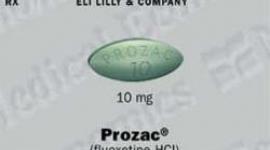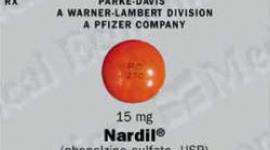Aventyl, Pamelor (Nortriptyline) Patient Information
Find out why Pamelor (Nortriptyline) is prescribed, side effects of Pamelor, Pamelor warnings, effects of Pamelor during pregnancy, more - in plain English.
Generic name: Nortriptyline hydrochloride
Brand names: Aventyl, Pamelor
Aventyl (nortriptyline hcl) Full Prescribing Information
Pamelor (nortriptyline hcl) Full Prescribing Information
Why Is Nortriptyline Prescribed?
Nortriptyline is used to treat depression. Nortriptyline is in a group of medications called tricyclic antidepressants. It works by increasing the amounts of certain natural substances in the brain that are needed to maintain mental balance.
How Should Nortriptyline Be Used?
Nortriptyline comes as a capsule and an oral liquid to take by mouth. It is usually taken one to four times a day and may be taken with or without food. Take nortriptyline at around the same times every day. Follow the directions on your prescription label carefully, and ask your doctor or pharmacist to explain any part you do not understand. Take nortriptyline exactly as directed. Do not take more or less of it or take it more often than prescribed by your doctor.
Your doctor will probably start you on a low dose of nortriptyline and gradually increase your dose.
Continue to take nortriptyline even if you feel well. Do not stop taking nortriptyline without talking to your doctor. If you suddenly stop taking nortriptyline, you may experience withdrawal symptoms such as headache, nausea, and weakness. Your doctor will probably want to decrease your dose gradually.
Other Uses for This Medicine
Nortriptyline is also sometimes used to treat panic disorders and post-herpetic neuralgia (the burning, stabbing pains, or aches that may last for months or years after a shingles infection). Nortriptyline is also sometimes used to help people stop smoking. Talk to your doctor about the possible risks of using this medication for your condition.
This medication may be prescribed for other uses. Ask your doctor or pharmacist for more information
What special precautions should I follow?
Before taking nortriptyline,
- tell your doctor and pharmacist if you are allergic to nortriptyline and other tricyclic antidepressants such as desipramine (Norpramin), clomipramine (Anafranil), imipramine (Tofranil), trimipramine (Surmontil),any other medications, or any of the ingredients in nortriptyline capsules or liquid. Ask your doctor or pharmacist for a list of the ingredients.
- tell your doctor if you are taking a monoamine oxidase (MAO) inhibitor such as isocarboxazid (Marplan), linezolid (Zyvox), methylene blue, phenelzine (Nardil), selegiline (Eldepryl, Emsam, Zelapar), and tranylcypromine (Parnate), or if you have stopped taking an MAO inhibitor within the past 14 days. Your doctor will probably tell you not to take nortriptyline. If you stop taking nortriptyline, you should wait at least 14 days before you start to take an MAO inhibitor.
- tell your doctor and pharmacist what prescription and nonprescription medications, vitamins, nutritional supplements and herbal products you are taking or plan to take. Be sure to mention any of the following: anticoagulants (blood thinners) such as warfarin (Coumadin, Jantoven); antihistamines; chlorpropamide (Diabinese); cimetidine (Tagamet); flecainide (Tambocor); guanethidine (Ismelin); lithium (Eskalith, Lithobid); medication for high blood pressure, seizures, Parkinson's disease, diabetes, asthma, nausea, mental illness, colds, or allergies; methylphenidate (Ritalin); muscle relaxants; propafenone (Rhythmol); quinidine; sedatives; selective serotonin reuptake inhibitors (SSRIs) such as citalopram (Celexa), escitalopram (Lexapro), fluoxetine (Prozac, Sarafem), fluvoxamine (Luvox), paroxetine (Paxil), and sertraline (Zoloft);sleeping pills; thyroid medication; and tranquilizers. Your doctor may need to change the doses of your medications or monitor you carefully for side effects.
- tell your doctor if you have recently had a heart attack. Your doctor may tell you not to take nortriptyline.
- tell your doctor if you have or have ever had an enlarged prostate (a male reproductive gland), difficulty urinating, diabetes, seizures, schizophrenia (a mental illness that causes disturbed or unusual thinking, loss of interest in life, and strong or inappropriate emotions), an overactive thyroid gland, or liver, kidney, or heart disease.
- tell your doctor if you are pregnant, plan to become pregnant, or are breast-feeding. If you become pregnant while taking nortriptyline, call your doctor.
- if you are having surgery, including dental surgery, tell the doctor or dentist that you are taking nortriptyline.
- you should know that this medication may make you drowsy. Do not drive a car or operate machinery until you know how this medication affects you.
- talk to your doctor about the safe use of alcohol while you are taking this medication.
- plan to avoid unnecessary or prolonged exposure to sunlight and to wear protective clothing, sunglasses, and sunscreen. Nortriptyline may make your skin sensitive to sunlight.
- you should know that nortriptyline may cause angle-closure glaucoma (a condition where the fluid is suddenly blocked and unable to flow out of the eye causing a quick, severe increase in eye pressure which may lead to a loss of vision). Talk to your doctor about having an eye examination before you start taking this medication. If you have nausea, eye pain, changes in vision, such as seeing colored rings around lights, and swelling or redness in or around the eye, call your doctor or get emergency medical treatment right away.
What special dietary instructions should I follow?
Unless your doctor tells you otherwise, continue your normal diet.
What should I do if I forget a dose?
Take the missed dose as soon as you remember it. However, if it is almost time for the next dose, skip the missed dose and continue your regular dosing schedule. Do not take a double dose to make up for a missed one.
What side effects can this medication cause?
Nortriptyline may cause side effects. Tell your doctor if any of these symptoms are severe or do not go away:
- nausea
- drowsiness
- weakness or tiredness
- excitement or anxiety
- nightmares
- dry mouth
- changes in appetite or weight
- constipation
- difficulty urinating
- frequent urination
- changes in sex drive or ability
- excessive sweating
Some side effects may be serious. If you experience any of the following symptoms or those listed in the IMPORTANT WARNING or SPECIAL PRECAUTIONS sections, call your doctor immediately or get emergency medical treatment:
- jaw, neck, and back muscle spasms
- slow or difficult speech
- shuffling walk
- uncontrollable shaking of a part of the body
- fever
- difficulty breathing or swallowing
- rash
- yellowing of the skin or eyes
- irregular heartbeat
Nortriptyline may cause other side effects. Call your doctor if you have any unusual problems while you are taking this medication.
If you experience a serious side effect, you or your doctor may send a report to the Food and Drug Administration's (FDA) MedWatch Adverse Event Reporting program online (http://www.fda.gov/Safety/MedWatch) or by phone (1-800-332-1088).
What should I know about storage and disposal of this medication?
Keep this medication in the container it came in, tightly closed, and out of reach of children. Store it at room temperature and away from excess heat and moisture (not in the bathroom).
Unneeded medications should be disposed of in special ways to ensure that pets, children, and other people cannot consume them. However, you should not flush this medication down the toilet. Instead, the best way to dispose of your medication is through a medicine take-back program. Talk to your pharmacist or contact your local garbage/recycling department to learn about take-back programs in your community. See the FDA's Safe Disposal of Medicines website (http://goo.gl/c4Rm4p) for more information if you do not have access to a take-back program.
It is important to keep all medication out of sight and reach of children as many containers (such as weekly pill minders and those for eye drops, creams, patches, and inhalers) are not child-resistant and young children can open them easily. To protect young children from poisoning, always lock safety caps and immediately place the medication in a safe location – one that is up and away and out of their sight and reach. http://www.upandaway.org
In case of emergency/overdose
In case of overdose, call the poison control helpline at 1-800-222-1222. Information is also available online at https://www.poisonhelp.org/help. If the victim has collapsed, had a seizure, has trouble breathing, or can't be awakened, immediately call emergency services at 911.
Symptoms of overdose may include
- irregular heartbeat
- seizures
- coma (loss of consciousness for a period of time)
- confusion
- hallucination (seeing things that do not exist)
- widened pupils (dark circles in the middle of the eyes)
- drowsiness
- agitation
- fever
- low body temperature
- stiff muscles
- vomiting
What other information should I know?
Keep all appointments with your doctor and the laboratory. Your doctor may order certain lab tests to check your response to nortriptyline.
Do not let anyone else take your medication. Ask your pharmacist any questions you have about refilling your prescription.
It is important for you to keep a written list of all of the prescription and nonprescription (over-the-counter) medicines you are taking, as well as any products such as vitamins, minerals, or other dietary supplements. You should bring this list with you each time you visit a doctor or if you are admitted to a hospital. It is also important information to carry with you in case of emergencies.
Brand names
Aventyl® and Pamelor®
Last Revised - 08/15/2017
Aventyl (nortriptyline hcl) Full Prescribing Information
Pamelor (nortriptyline hcl) Full Prescribing Information
Detailed Info on Signs, Symptoms, Causes, Treatments of Depression
Detailed Info on Signs, Symptoms, Causes, Treatments of ADHD
Detailed Information on Parenting Difficult or Special Children
APA Reference
Staff, H.
(2009, January 3). Aventyl, Pamelor (Nortriptyline) Patient Information, HealthyPlace. Retrieved
on 2025, December 13 from https://www.healthyplace.com/other-info/psychiatric-medications/patient-information-pamelor-nortriptyline

